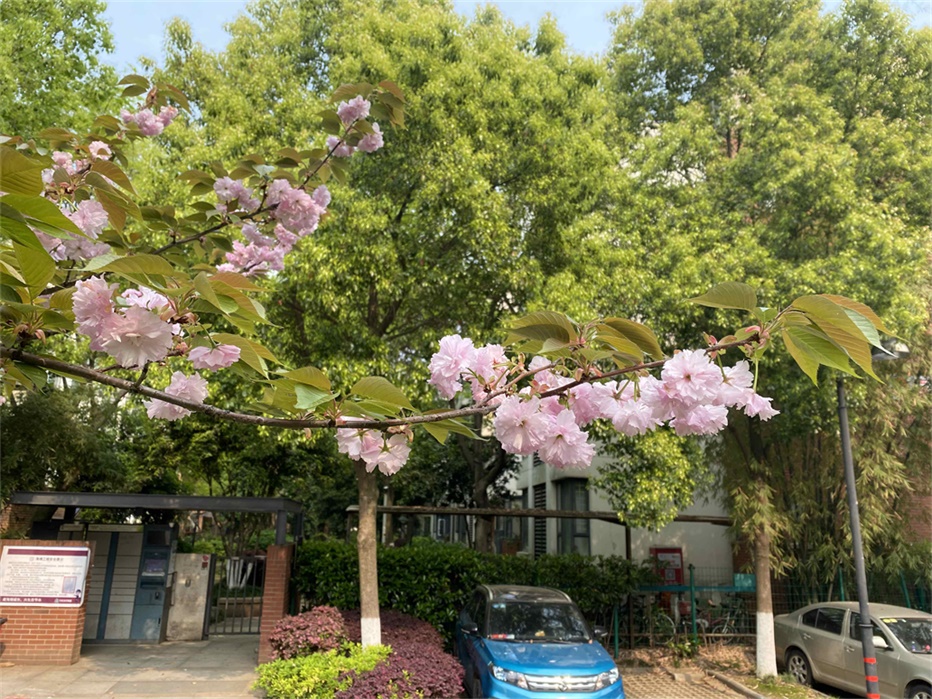
Cherry blossoms. (Photo credit: Ai Xiaoming. Used with permission.)
The following post is the seventeenth and the last installment in a series of diaries written by independent filmmaker and feminist scholar Ai Xiaoming and feminist activist Guo Jing. Both are living in Wuhan, at the initial center of the COVID-19 pandemic. Here are the links to the first, second, third, fourth, fifth, sixth, seventh, eighth, ninth, tenth and eleventh, twelfth, thirteenth, fourteenth, fifteenth, and sixteenth parts of the series.
Check out Global Voices’ special coverage of the global impact of COVID-19.
Ai Xiaoming: Published on Matter News on April 10, 2020
日记得以进入后世,我们看到,其中的一个标尺或者说重要的中介,是时间。对于后人,有些隐私不再重要,而其中不为人知的个人体验以及历史细节,呈现出非同寻常的意义。过去的日记作者在乎私密性,因为隐蔽才有自由,才能摆脱意识形态的监控、社会规范的压迫、他人的告发以及日记所涉人的围攻。而对于后世的读者,日记仿佛化蛹为蝶,超越了历史、社会和时间的限制。那些可能伤害到日记作者的故人旧事颓然而退,日记脱颖而出。
从经验的角度来说,当我们写日记时,我们享有的自由包括与社会、与他人以及与自我的一部分(借用弗洛伊德的概念,那个处在社会化过程中的自我)相抵触的自由(根据某种主流的价值判断,也许某些内容是反社会、反主流、反规训的)。
但在现实中,情况往往不一样。也就是说,当一个人通过日记不断地强化自己的自我意识,不断地锤炼出独特的思想个性时,这与社会规范、与统治者的意识形态,势必发生冲突。真实的日记,与思想专制注定是格格不入的。因此,在专制时代,日记写作无可避免地陷入危境。
言论管控越严厉,日记的私密性连同书写者的写作个性越难维持;写日记的行为本身就被看作离经叛道。
可以说,日记的一个迷人之处正是在于它的异议性。它在当时当世所需要维持的私密性是有道理的,越私密,越自由;越有利于作者维护个人的内心世界,无所顾忌地表达对生活的独特审视。
即使是生活化的日记叙事,那些令我们感动的书写,也来自它的异议性——与宏大叙事的距离。
以方方日记和郭晶日记为例,包括其他一些类似的文本;与其说是个人日记,不如说,是个人记录加公民报道的合成。
换言之,它是日记体,即采用了这种比较自由、从个人观察和经历出发的文体,但它诉诸的对象不限于作家自己,而更多的是社会公众。
由于它主要是对公众说话,它的战地报道的意义,大过它与自己内心对话的意义。
那日记怎么写成了公民报道的?我觉得,在估计这一时期任何人的日记成就时,不能忘记一个基本的事实,那就是言论管控的存在和报道者的牺牲。
我们如果不是故意遗忘或者无视自己的恐惧,就必须承认,在此次疫情最危险和艰难的时候,武汉的战地记者不是被封闭在小区的作者,而是敢于直接进入一线医院、殡仪馆和高风险感染社区的报道者,如陈秋实、李泽华、方斌、张展、张毅……等。记者中最有勇气的,非公民记者莫属;他们是地地道道的逆行者。
他们没有官方颁发的记者证,缺乏基本的采访保障;连生命安全也难以顾及。可正是从他们这里,我们听到了最脆弱者的声音;看到了最无助者的绝望。在社交媒体上,我们每天也看到来自城市各个角落的小视频,很多普通公民发出真实的呐喊。我们决不能忘记,有几位自媒体人被强制销声。时至今日,武汉已经解封,我们依然没有听到有关他们的任何消息。
日记体的兴起,就是在公民报道被封杀期间的退让。它得到读者的追捧,也是由于,人们看不到更多的、直接来自社会基层的战地报道。
When diaries are published, they are mediated by time — their meanings are interpreted differently at different periods of time. As time passes, privacy takes on less importance, and the personal experience and historical details contained in the diaries become more precious. In the past, diary writers would be very concerned about privacy, as only keeping their diaries secret allowed them to write with any freedom. Secrecy is a way of escaping government censorship and social repression, circumventing speech polices and attacks from people mentioned in the diaries. As time passes, diaries are like caterpillars transforming into butterflies. They surpass the restrictions imposed by place and time. Those able to punish the diary writers fade into history, but the diaries still exist and stand out.
When we write diaries, we revel in the freedom to go against society, others, and part of our “selfhood” — the “ego” that Freud refers to as central to the process of socialization. From the perspective of the mainstream, some of the contents of our diaries are anti-social, anti-mainstream, and anti-discipline.This is our reality. When writers strengthen their self-consciousness, building their independent thinking and personality in their diaries, society and the dominant ideology find faults between the lines and confront the writers. Any genuine diary will be at odds with ideological dictatorship. Hence, in the era of authoritarian rule, diary writing inevitably falls into dangerous territory.
As censorship keeps tightening, it is more difficult for writers to maintain their privacy and personal writing style. The act of writing a diary is considered unorthodox at any rate. Even if the diary is focused on banal, daily etiquette, what appeals is the dissent it contains, far removed from grand official narratives.
Take the diaries of Fang Fang and Guo Jing as well as other texts in the same genre as examples, they read more like a combination of personal records and citizen reports than personal diaries.
In other words, these texts are written in the form of diary — a genre that gives more freedom to personal observations and experiences. But the audience is now public rather than private.
As these “diaries” seek dialogue with the general public, they function more as reports from the front line than dialogues with the writers’ inner selves.
Why did these writers turn their diaries into citizen reports? When we estimate what these diaries have achieved, we should not forget the existence of censorship and the sacrifice of our reporters.If we do not intentionally forget or ignore our fear, we must admit that at the time when the pandemic was most dangerous and difficult, front line reporters in Wuhan, who dared to enter hospitals, funeral homes, and high-risk infection communities — reporters like Chen Quishi, Li Zehua, Fang Bin, Zhang Zhan, Zhang Yi, etc — are the most courageous ones. They went against all the odds.
They do not hold official journalist licenses and have zero protection when compared to other journalists. Their lives and security were also at risk. Thanks to their reports, we heard the voices from the most fragile people and saw the despair of the most helpless. On social media, we saw videos taken from different corners of different cities and heard people pouring out feelings from their hearts. We should never forget that several reporters were forced to shut up. Even after Wuhan lifted its lockdown, we have not heard news of their whereabouts.
The rise of the diary genre is our concession to the citizen journalists who got shut down. The diaries are praised by readers because people lack access to reports coming from the front line and the grassroots.







